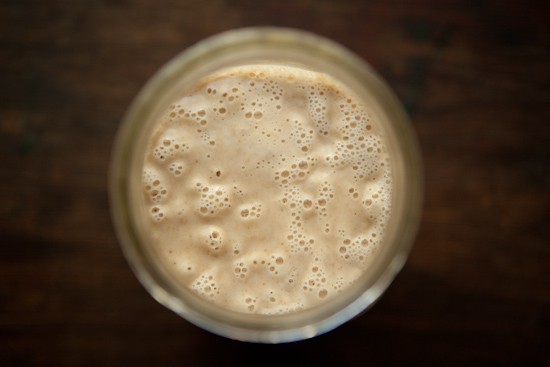Thanks. I got lucky, I think.

Recipe?! Yes, that's the point, I can post my method but
I don't guarantee success. What worked for me may not work for you: indeed, as I posted above, I had several failures before coming up with this.
It's a long-drawn-out process. Making the starter takes about a week.
Anyway, I start with rye flour (organic, stoneground) and bottled spring water ("still", of course, any cheapo supermarket brand will do). I keep the starter in a 500ml kilner jar which will comfortably hold about 300ml of starter. Start with 25g flour and 50ml water, mix well, cover jar with clingfilm (do not close the lid) and store in warm kitchen for 24 hours.
Next day, add another 25g flour and 50ml water, stir in, cover and leave for another 24 hours.
Next day, add 50g flour and 100ml water, stir in, cover and leave for another 24 hours.
You can see where this is leading! If you keep on doubling every day, after a few weeks you'll have used up the entire world's stock of flour plus all its fresh water. Therefore, on the next day, and subsequent days, you have to
pour away half your starter and then add another 50g flour and 100ml water. This is a bit wasteful but there is no alternative.
After about six or seven days the starter should be fizzing nicely. I haven't got a picture of mine, but it should look like this:

If it doesn't, you probably have a dud. Try a different flour maybe, and start over.
Once the starter is nicely working, you can seal the lid (n.b. don't use a screwtop jar, it may explode) and put it in the fridge. It will only need 'feeding' every week or so. It will separate out into a clear, yellowish brown layer on top and a murky layer underneath, and smell quite foul, but this is quite normal.
When you want to make bread, if using your starter out of the fridge, feed it the day before: stir thoroughly, pour away about 150ml, then add 100ml bottled still water and 50g rye flour and stir in. Do this in the morning, leave the jar open but cover with clingfilm, leave in warm kitchen for 12 hours.
Next step is making the bread itself. I now switch to wheat flour:
50% strong wholemeal and 50% strong white for the latest attempt 100% strong wholemeal currently, though you can experiment here.
Then make a pre-dough later that evening. Stir the starter and mix 50ml with 200g flour and 100ml lukewarm water (tap water ok now) in a bowl, knead gently, cover with clingfilm and leave in a warm place overnight. Next day, mix
900g flour,
½ tsp caraway seeds (optional),
30 ml cooking oil,
600ml lukewarm water, and the prepared
pre-dough, start kneading and when the dough starts to form sprinkle on
1½ to 2 tsp salt. Knead well for 10 minutes, return to bowl, cover and leave in warm place to rise for about 3-7 hours (n.b. this is much longer than you would allow for yeast bread, and depends on the 'vigour' of your starter.). The dough should at least double in size: in our 28cm bowl it almost reaches the top of the bowl. Then take it out and knead for a further 1 minute, form into two loaves and place on floured baking sheets. Cover and leave to prove for another 60-90 minutes or so.
Heat oven to 200C. Just before putting loaves in oven,
turn them upside-down (this seems to help against forming large cavities under the crust) and re-form into loaves - the dough will probably have spread out a lot. Bake for 30 minutes. Turn out on wire rack to cool. Enjoy.
[edit] recipe updated 23/03/2020 to match my current recipe.